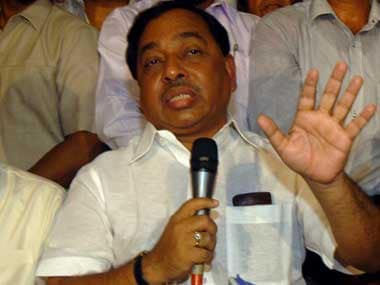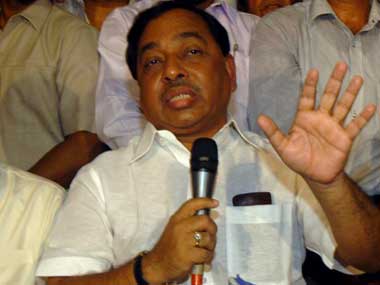Healthcare in rural India is so substandard and pathetic that it evokes horror more than anything else. If galloping costs and unaffordable treatment is the bane of healthcare in the urban and semi-urban parts of the country, in rural areas, it is as good as non-existent. There is an acute paucity of doctors, paramedics and hospitals in rural areas and the government healthcare machinery is not just poorly staffed and poorly equipped but largely apathetic in its approach to rural healthcare. Therefore we continue to hear stories of rural folks dying in their villages or suffering complications due to want of good medical attention. Even for the simplest of surgeries and treatment, rural folks have to often rush to the nearest hospital in a taluka town or complicate their lives by going to a quack. [caption id=“attachment_1000277” align=“alignleft” width=“380”]  Congress leader Narayan Rane. AFP[/caption] Exactly a year ago, in July 2012, drawing room audiences across the country were outraged after a TV channel showed a ward boy administering injections and a sweeper stitching wounds on an accident victims at the Bulandshahar District Government Hospital in Uttar Pradesh.TV anchors went hysterical after the medical supervisor who was later suspended under media pressure, defended the ward boy. He said that that the ward boy had provided medical assistance on numerous occasions in the past and had done so under the supervision of the few doctors on duty. Take the case of an 86-year-old woman who suffered a hip fracture two years ago in the taluka town of Phaltan in sugar-rich western Maharashtra. For more than an hour there was no ambulance to bring her to the local, private hospital. When a rickety ambulance arrived, it was without paramedics. After a poor quality X-ray, the doctor decided that surgery could be done only after five days. In sheer frustration, she had to be moved to an orthopedic hospital in Pune, 86km away; the ambulance driven at a painfully slow speed, on the heavily potholed Phaltan-Pune road. “Half of Silicon Valley is owned by my batch-mates from IIT, Kanpur. I repent having returned to India 30 years ago to settle in Phaltan to do research for rural development… Think of how the rural people are suffering for want of decent healthcare…”. This was the anguish of that lady’s son — Anil Rajvanshi, a well-known US-returned researcher developing renewable energy technologies and devices for rural India. Rajvanshi can afford to take his mother to the best of India’s hospitals. But what about the millions of people in rural India who are crying out for a decent healthcare system? Certainly, there are many outstanding examples in rural healthcare such as the Nargis Dutt Memorial Cancer Hospital at Barshi in Solapur district or the Aravind Eye Care System in Tamil Nadu. However, the need for basic healthcare continues to be enormous in the country. Thus, how should how should the people react when a controversy-ridden politician like state industries minister Narayan Rane is accused of using his political might to secure the government’s nod to establish a medical college in his home district Sindhudurg? The Marathi daily Loksatta in a banner report on July 30 alleged that the Maharashtra government had cleared a proposal by Rane family-controlled Sindhudurg Shikshan Prasarak Mandal to establish a medical college with a capacity for 100 seats at Padve, Kankavli in Sindhudurg district. The report alleged that Rane’s proposal was cleared by the Maharashtra government even though it failed to fulfill essential criteria laid down by the Medical Council of India such as 25 acres of land, medical infrastructure and a 300-bed hospital attached to the medical college. Rane’s politician-son Nitesh who is the secretary of the educational trust responded to the newspaper saying that the fact that the government had given clearance meant that the essential criteria has been fulfilled. “It is for the government to examine whether all the procedures have been complied with or not.” Before he switched to the Congress in 2005, Rane spent his entire life with the Shiv Sena and rose to become the state’s chief minister under the Sena-BJP government. He carries the reputation of a street-fighter and gang-leader in his early years and has been linked to numerous controversies, allegations of land grab, acts of violence, intimidation and even had a murder charge against him from which he was acquitted. He has a family-run hotel business, a newspaper and is said to have amassed prime real estate. Rane’s desire to establish a medical college is interesting because he does not want it based in Pune or Mumbai but in remote Kankavli in Sindhudurg district, where no one but a son of the soil would be willing to go. Kankavli means the same to Narayan Rane as Baramati does to Sharad Pawar. The fact is that politicians have not taken to establishing medical colleges and rural hospitals in the same manner as rural educational institutions. A large number of politicians within and outside Maharashtra have established hundreds of multi-institutional educational complexes, but very few have ventured into doing the same with healthcare. The cooperative movement driven by politicians was one of the vehicles for the spread of educational institutions in Maharashtra, before politicians and others became greedy and woke up to the money-making opportunities that education offered. Rural people need healthcare facilities urgently and at this stage, any addition to the existing infrastructure would be welcome. Politicians with their power, influence, mass mobilisation and networking abilities are ideally positioned to establish rural hospitals and will also earn enormous goodwill if these projects are well-run. For the sake of the people in and around Kankavli, Rane needs to be encouraged in his initiative to establish a medical college at Kankavli. At the same time, he should be hammered adequately by the media and others to ensure that his medical college fulfills all the rules stipulated under law.
Rane’s desire to establish a medical college is interesting because he does not want it based in Pune or Mumbai but in remote Kankavli in Sindhudurg district.
Advertisement
End of Article


)
)
)
)
)
)
)
)
)



